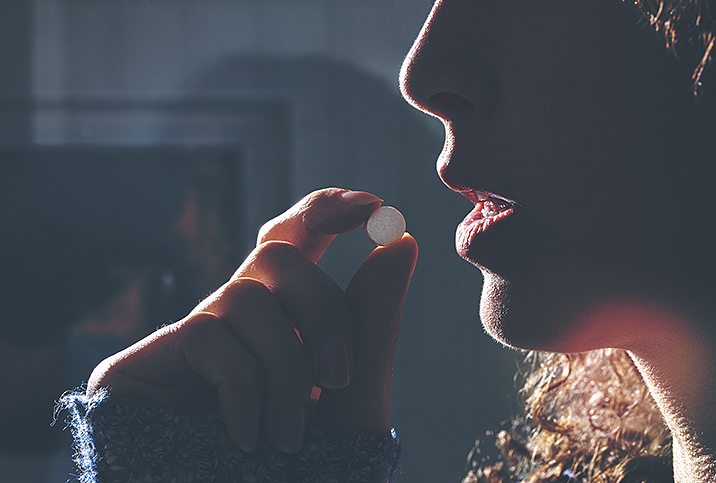A Guide to Sex on Antidepressants

While taking antidepressants called SSRIs, or selective serotonin reuptake inhibitors, many people experience sexual side effects. These medications provide the brain with more serotonin, a chemical neurotransmitter that enhances overall mood. However, serotonin and another chemical called dopamine work together in the brain, so as serotonin elevates mood and decreases anxiety, the chemical changes may impact sexual desire, arousal and the ability to orgasm. While changes in desire may be hard to measure, the National Center for Biotechnology Information notes that 40 percent of individuals on antidepressants experience some form of sexual dysfunction.
Each person responds to medication differently, and age and dosage play a role as well, but if you’re frustrated with the sexual side effects of your medication, these tips may help.
Discuss your prescription with your physician
Changing or adding medications or simply adjusting the dosage can help ease sexual dysfunction. While some SSRIs have different side effects than others, switching to norepinephrine-dopamine reuptake inhibitors (NDRIs) such as Wellbutrin, which increases dopamine, could be a solution. Adding supplementary medications like erectile dysfunction one may help men, while women may find that bupropion eases their sexual side effects. Adjusting the dosage of your SSRI may offer some relief as well, but do so only after consulting your doctor.
Whether you change or adjust your medication, you'll need some patience. Don't expect immediate changes and monitor yourself for a few weeks or a month. As you navigate antidepressants and your sex life, the key is careful research into what works best for you.
Consider the effects of timing
Everyone wants a quick fix for their problems, but two timing rules are key when managing the sexual side effects of antidepressants. First, see if the sexual effects decrease over time, which may take months. Your priority should be treating your anxiety or depression, so be sure to give your body time to adjust.
The second rule of timing relates to your medication's dosage, as the effects of once-daily antidepressants tend to be less noticeable the final few hours before the next dose. Switching when you take your medication based on your usual sexual habits may help decrease its impact on your sex drive.
Change your sexual routine
Don’t be afraid to shake up your sexual go-tos, maybe getting creative with sex toys or role play to change things up. You can also self-stimulate at first to get in the mood and don't be afraid to guide your partner with your hands as you know your body best. Antidepressants can reduce vaginal lubrication, so add lube, which can enhance sensation or even be used for anal play, for the comfort of everyone involved.
Talk to your partner
A more enjoyable sex life begins with open communication. You might even consider it foreplay to let them know what you are experiencing and how you'd like to change things, including new forms of stimulation. Don't be surprised by your partner's support and willingness to experiment as intimacy plays a vital role in the quality of a relationship and the happiness of everyone involved.
Reassure your partner that their performance is not the issue, but given the effects of the medication, you’d like to make changes to help increase your pleasure. You may find that having this conversation outside the bedroom helps with performance anxiety and intimidating expectations. By patiently tackling the problems head-on as partners, you can help strengthen your relationship. And remember: Sex revolves around intimacy and not just sprinting to orgasm.
Stay positive
Sexual dysfunction can have a significant impact on your quality of life, relationships and even self-esteem. Know that with open communication, some trial and error and more than a little patience, you can still enjoy the benefits of your antidepressants and a healthy sex life at the same time.


















